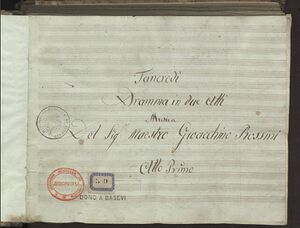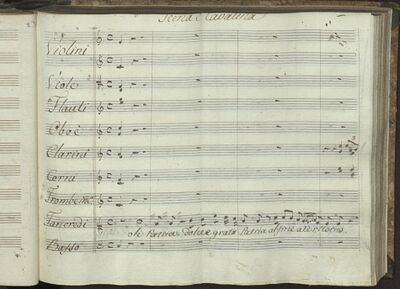Difference between revisions of "Di tanti palpiti"
| (11 intermediate revisions by the same user not shown) | |||
| Line 1: | Line 1: | ||
{{Short description|aria from the opera Tancredi}<!-- no repetition of page title--> | {{Short description|aria from the opera Tancredi}}<!-- no repetition of page title--> | ||
<!-- if it is not a solitary work, here comes the infobox from the work containing it. E. g., not “Casta Diva” but “Norma”--> | <!-- if it is not a solitary work, here comes the infobox from the work containing it. E. g., not “Casta Diva” but “Norma”--> | ||
{{Infobox opera | {{Infobox opera | ||
| name = Tancredi | | name = [[Tancredi]] | ||
| type = Opera seria | | type = Opera seria | ||
| composer = [[Gioachino Rossini]] | | composer = [[Gioachino Rossini]] | ||
| Line 15: | Line 15: | ||
| premiere_location = Teatro La Fenice, Venice | | premiere_location = Teatro La Fenice, Venice | ||
}} | }} | ||
The upbeat '''"{{lang|it|Di tanti palpiti}}"'' is sung by the main character in [[Gioacchino Rossini]]'s opera [[Tancredi]]. The story of | The upbeat '''"{{lang|it|Di tanti palpiti}}"''' is sung by the main character in [[Gioacchino Rossini]]'s opera [[Tancredi]]. The story of secret love thwarted by politics of the day in times of war is following the plot of Voltaire's ''Tancrède''. | ||
The plot is set in Sicily, 1005 | The plot is set in Sicily, 1005 AD. Tancredi has just returned to Syracuse in disguise. He is determined to risk his life for Amenaìde and longs to see her again.<ref name="Wiki"/> | ||
In the premiere cast, the part of Tancredi was sung by [[Adelaide Melanotte | In the premiere cast, the part of Tancredi was sung by [[Adelaide Melanotte]].<ref name="Wiki"/> | ||
The piece was instantly popular and inspired many other musicians. Niccolo Paganini picked up the tune in his ''Variations on 'I palpiti', Op.13''.<ref name="Paganini"/> [[File:Var 1 paganini di tanti palpiti.jpg|400px|thumb|alt=The beginning of the first variation to "Di tanti palpiti" by Niccolò Paganini|The beginning of the first variation to "Di tanti palpiti" by Niccolò Paganini<ref name="Paganini"/>]] | The piece was instantly popular and inspired many other musicians. Niccolo Paganini picked up the tune in his ''Variations on 'I palpiti', Op.13''.<ref name="Paganini"/> [[File:Var 1 paganini di tanti palpiti.jpg|400px|thumb|alt=The beginning of the first variation to "Di tanti palpiti" by Niccolò Paganini|The beginning of the first variation to "Di tanti palpiti" by Niccolò Paganini<ref name="Paganini"/>]] | ||
| Line 36: | Line 36: | ||
! Album | ! Album | ||
|- | |- | ||
| 2021 | | [[2021]] | ||
| [[À sa guitare (Album)]] | | [[À sa guitare (Album)]] | ||
| [[Thibaut Garcia]] | | [[Thibaut Garcia]] | ||
| Line 47: | Line 47: | ||
! With | ! With | ||
|- | |- | ||
| 2021 | | [[2021]] ‐ [[2022]] | ||
| [[À sa guitare (Concert program)]] | | [[À sa guitare (Concert program)]] | ||
| [[Thibaut Garcia]] | | [[Thibaut Garcia]] | ||
|- | |- | ||
| 2021 | | [[2021]] | ||
|[[Jean-Christophe Spinosi and Philippe Jaroussky with the Berliner Philharmoniker]]<ref name="BerlinPhil"/> | |[[Jean-Christophe Spinosi and Philippe Jaroussky with the Berliner Philharmoniker]]<ref name="BerlinPhil"/> | ||
|[[Jean-Christophe Spinosi]], [[Berliner Philharmoniker]] | |[[Jean-Christophe Spinosi]], [[Berliner Philharmoniker]] | ||
| Line 64: | Line 64: | ||
{{Song header <!-- use of this template automatically includes Template:Custom/songinfo.css --> | {{Song header <!-- use of this template automatically includes Template:Custom/songinfo.css --> | ||
| title = Di tanti palpiti | | title = Di tanti palpiti | ||
| english-title = | | english-title = Of so many heartthrobs | ||
| composer = [[Gioacchino Rossini]] | | composer = [[Gioacchino Rossini]] | ||
| lyricist = [[Gaetano Rossi]] | | lyricist = [[Gaetano Rossi]] | ||
| Line 78: | Line 78: | ||
| country =Italy | | country =Italy | ||
| language-note = | | language-note = | ||
| libretto-text =<poem>{{lang|it|Oh patria! dolce e ingrata patria, | | libretto-text =<poem>{{lang|it|'''Recitativo''' | ||
Oh patria! dolce e ingrata patria, | |||
alfine a te ritorno! | alfine a te ritorno! | ||
Io ti saluto! | Io ti saluto! | ||
| Line 100: | Line 101: | ||
coronate la mia fe’. | coronate la mia fe’. | ||
'''Cavatina''' | |||
Di tanti palpiti, di tante pene, | Di tanti palpiti, di tante pene, | ||
da te mio bene, spero mercè. | da te mio bene, spero mercè. | ||
| Line 113: | Line 115: | ||
Mi rivedrai, ti rivedrò. | Mi rivedrai, ti rivedrò. | ||
Ne’ tuoi bei rai mi pascerò. | Ne’ tuoi bei rai mi pascerò.}}<ref name="RossiniGesellschaft"/></poem> | ||
}}<ref name="RossiniGesellschaft"/></poem> | |||
}}{{Libretti | }}{{Libretti | ||
| country =United Kingdom | | country =United Kingdom | ||
| language-note = | | language-note = | ||
| libretto-text =<poem> | | libretto-text =<poem>'''Recitativo''' | ||
Oh, fatherland, sweet and ungrateful fatherland, | Oh, fatherland, sweet and ungrateful fatherland, | ||
at last, I return to you! | at last, I return to you! | ||
| Line 131: | Line 132: | ||
I have come at last; I want to – | I have come at last; I want to – | ||
challenging my destiny, | challenging my destiny, | ||
whatever it may be – | whatever it may be – prove myself worthy of you or perish, | ||
my soul. | my soul. | ||
| Line 141: | Line 142: | ||
crown my faith. | crown my faith. | ||
Of so many | '''Cavatina''' | ||
Of so many heartthrobs, of so much suffering, | |||
I hope you will pardon me. | I hope you will pardon me. | ||
You will see me again; I will see you again. | You will see me again; I will see you again. | ||
| Line 148: | Line 150: | ||
Madness – sighs, gasps - joy! | Madness – sighs, gasps - joy! | ||
It will be happy | It will be happy – my heart tells me so. | ||
my destiny | my destiny – by your side. | ||
You will see me again; I will see you again. | You will see me again; I will see you again. | ||
I shall bask in your radiance | I shall bask in your radiance | ||
| Line 158: | Line 160: | ||
| country = France | | country = France | ||
| language-note = Poetic French translation | | language-note = Poetic French translation | ||
| libretto-text =<poem>{{lang|fr|O Patrie ! ingrate Patrie ! | | libretto-text =<poem>{{lang|fr|'''Recitativo''' | ||
O Patrie ! ingrate Patrie ! | |||
je revois ta rive chérie. | je revois ta rive chérie. | ||
Salut noble séjour, | Salut noble séjour, | ||
| Line 180: | Line 183: | ||
oui, oui ce bras sera vainqueur. | oui, oui ce bras sera vainqueur. | ||
'''Cavatina''' | |||
Douce espérance, plus de souffrance, | Douce espérance, plus de souffrance, | ||
que sa constance comble mes vœux, | que sa constance comble mes vœux, | ||
| Line 196: | Line 200: | ||
<div class="footnotes"> | <div class="footnotes"> | ||
<poem> | <poem> | ||
Translation by Jean-Frédéric-Auguste Lemière de Corvey (1771-1832), 1827<ref name="Pesaro"/> | Translation by Jean-Frédéric-Auguste Lemière de | ||
<nowiki>*</nowiki>) maybe an old form of "aïeul", pl. "aïeuls", engl.: "the ancestors" | Corvey (1771-1832), 1827<ref name="Pesaro"/> | ||
<nowiki>**</nowiki>) The line "ton feu m’agite, il m’enflamme" is repeated to fit with the Italian "secondate il bel desio".</poem> | <nowiki>*</nowiki>) maybe an old form of "aïeul", pl. "aïeuls", | ||
engl.: "the ancestors" | |||
<nowiki>**</nowiki>) The line "ton feu m’agite, il m’enflamme" | |||
is repeated to fit with the Italian "secondate il bel desio".</poem> | |||
</div> | </div> | ||
}} | }} | ||
| Line 259: | Line 266: | ||
|archive-date={{date|2021-10-01|MDY}} | |archive-date={{date|2021-10-01|MDY}} | ||
|quote=}}</ref> | |quote=}}</ref> | ||
<ref name="English">Translation to English: Birikein & FR, 2021</ref> | |||
<ref name="IMSLP"> | <ref name="IMSLP"> | ||
{{cite web | {{cite web | ||
Latest revision as of 19:19, 13 October 2021
| Tancredi | |
|---|---|
| Opera seria by Gioachino Rossini | |
 Cover of "Tancredi" | |
| Librettist | Gaetano Rossi |
| Language | Italian |
| Based on | Tancrède by Voltaire |
| Premiere | 6 February 1813 Teatro La Fenice, Venice |
The upbeat "Di tanti palpiti" is sung by the main character in Gioacchino Rossini's opera Tancredi. The story of secret love thwarted by politics of the day in times of war is following the plot of Voltaire's Tancrède.
The plot is set in Sicily, 1005 AD. Tancredi has just returned to Syracuse in disguise. He is determined to risk his life for Amenaìde and longs to see her again.[1]
In the premiere cast, the part of Tancredi was sung by Adelaide Melanotte.[1]
The piece was instantly popular and inspired many other musicians. Niccolo Paganini picked up the tune in his Variations on 'I palpiti', Op.13.[2]

"Di tanti palpiti" appears on the following album:
| Year | Album | With |
|---|
| Year | Album | |
|---|---|---|
| 2021 | À sa guitare (Album) | Thibaut Garcia |
It is part of the following concert programs:
Libretto
from Tancredi
Gioacchino Rossini (music), Gaetano Rossi (words)
Recitativo | |
Recitativo | |
Poetic French translation | |
Recitativo Translation by Jean-Frédéric-Auguste Lemière de | |
Manuscripts and sheet music

- Free Scores at the IMSLP:
- Manuscript
- Biblioteca del Conservatorio "L.Cherubini" di Firenze
- Shelfmark: B-I-87
- "Tancredi (Rossini, Gioacchino), Manuscript". Archived from the original on October 1, 2021. Retrieved October 1, 2021.[7]
- French Manuscript
- Score of the Paris premiere
- 7 Septembre 1827, sur le Théatre l'Odéon
- Jean-Frédéric-Auguste Lemière de Corvey (1771-1832)
- Translator: Édouard d'Anglemont (1798-1876), French text
- Paris: E. Troupenas, n.d. Plate n.d.(ca.1827).
- Public Domain
- Biblioteca Fondazione Rossini Pesaro[6]
References
- ↑ 1.0 1.1 "Tancredi". Wikipedia. Archived from the original on October 1, 2021. Retrieved October 1, 2021.
- ↑ 2.0 2.1 "Variations on 'I palpiti', Op.13 (Paganini, Niccolò)". IMSLP. Archived from the original on 9 October 2021. Retrieved 9 October 2021.
- ↑ "Philippe Jaroussky, Thibaut Garcia". Digital Concert Hall. Archived from the original on 4 October 2021. Retrieved 4 October 2021.
- ↑ "Tancredi, libretto". Rossinigesellschaft. Archived from the original on October 1, 2021. Retrieved October 1, 2021.
- ↑ Translation to English: Birikein & FR, 2021
- ↑ 6.0 6.1 "French Manuscript, translation by Jean-Frédéric-Auguste Lemière de Corvey (1771-1832); "Di tanti palpiti" at p. 162". IMSLP. Paris: E. Troupenas, n.d. Plate n.d.(ca.1827). at: Biblioteca Fondazione Rossini Pesaro. Archived from the original on 9 October 2021. Retrieved 9 October 2021.
- ↑ 7.0 7.1 "Tancredi (Rossini, Gioacchino), Manuscript". IMSLP. Archived from the original on October 1, 2021. Retrieved October 1, 2021.